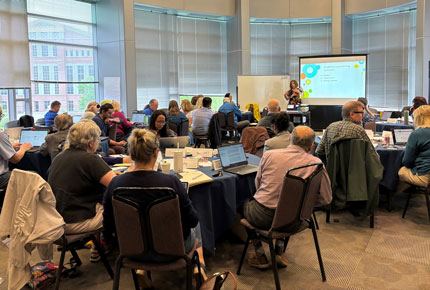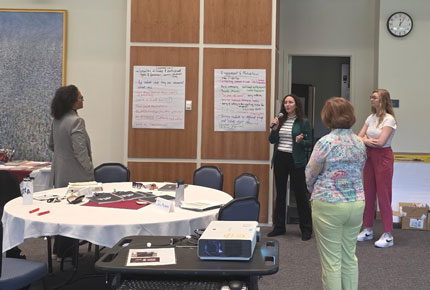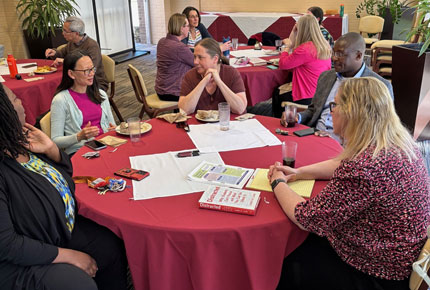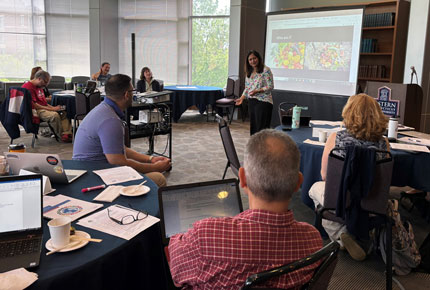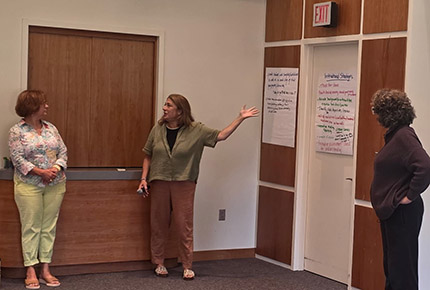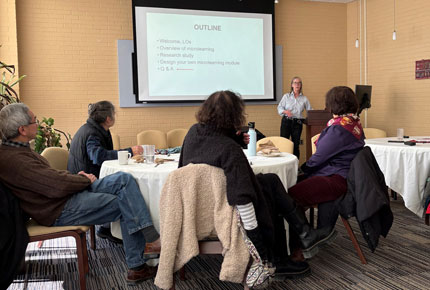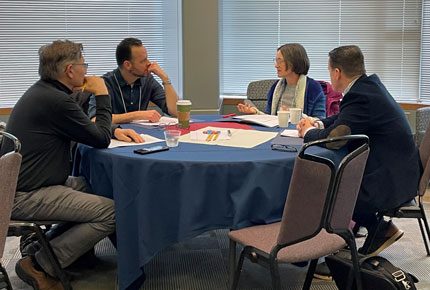Designing AI Resistant Assignments & Assessments
to Future-Proof Your Courses
Thursday, May 29, 9 am - 1 pm (arrive at 8:30 for breakfast)
Held in Dr. David G. Carter Science Building room 301
Led by Cynthia Alby, Professor of Teacher Education and Faculty Director for High Impact Practices at Georgia College (a COPLAC institution)
In an era where AI tools like ChatGPT are becoming increasingly sophisticated, educators face the challenge of designing assignments that truly reflect student understanding and creativity. This workshop will equip you with innovative strategies to create assessments that not only resist AI manipulation but also enhance student engagement and learning outcomes. Through interactive sessions, you'll explore techniques to craft assignments that encourage critical thinking and originality. With the support of the author of Learning That Matters: A Field Guide to Course Design for Transformative Education, you will develop practical solutions tailored to your discipline. Whether you're a seasoned professor or new to teaching, you won't want to miss this opportunity to stay ahead of the curve and ensure your assessments remain relevant and impactful in the digital age.
About Cynthia Alby: Cynthia Alby, Ph.D., is a Professor of Teacher Education at Georgia College. Her primary research questions revolve around reimagining education and enchanting learning so both teachers and students can flourish. She is also co-author of Learning that matters: A field guide to course design for transformative education, and for more than 20 years she has also developed Georgia faculty through the “Governor’s Teaching Fellows Program” through the Louise McBee Institute of Higher Education at the University of Georgia.
Access materials from this workshop.
Swift Waters Workshop – Sustainability Across the Curriculum
Wednesday, May 28, 2025, 9 am to 4 pm
Johnson Room
*Stipend possible for Eastern faculty
Priority Deadline for Applications: May 1, 2025
Presenters: Syndey Clements, Bryan Connolly, Suki Grandhi, Sarah Walters
Thanks to a grant from the Association for the Advancement of Sustainability in Higher Education (AASHE), Eastern will host a full-day workshop focused on preparing faculty to design new assignments, units, or courses that incorporate sustainability through the lens of their primary academic disciplines.
"Sustainability" encompasses a bold framework of goals aimed at ending poverty and hunger, fostering peace and equity, and ensuring that all people can lead fulfilling, prosperous lives. It prioritizes a healthy planet, safeguarded from degradation, requires us to address climate change, and honor the needs of future generations.
The Swift Waters workshop will promote curricular innovation through exposure to the interdisciplinary themes inherent to sustainability. The “Wicked Problems” inherent in sustainability themes align with High-Impact Practices such as Collaborative Assignments, Community-based Learning, Diversity/Global Learning, and Research.
Workshop participants will hear from Eastern faculty about how they have integrated these complex issues into their courses, and why they feel this work is important. (See website for speaker bios.) Participants will also have time to work on developing a new course or modifying an existing course.
Questions? Contact Dr. Patty Szczys at szczysp@easternct.edu.
Designing Ethical Reasoning and Quantitative Literacy Assignments
Tuesday, May 27, 2025, 9 am to 3:30 pm (lunch provided)
Led by Courtney Broscious, Suki Grandhi, Nicole Krassas, and Megan Heenehan
This interactive working session will focus on creating purposeful assignments that help students develop and demonstrate their ethical reasoning (ER) or quantitative literacy (QL) skills. Participants will explore the ER and QL rubrics in depth, identify expected performance levels for students in their ELAC course, and work on an ER or QL assignment. Faculty presenters will share examples of ER and QL assignments that meet course objectives and are closely aligned with ELAC rubrics. Participants will be introduced to the principles of transparent assignment design and get guidance on identifying ways to make their own assignments more transparent. Participants will have time work on their own ER or QL assignment and get feedback from peers. The goal is for each participant to leave the workshop with a draft of an improved assignment.
Access materials from this session (Eastern login required).
Teaching in the Age of Distraction: Lessons Learned from Eastern's Faculty Learning Community
Monday, April 28, 1 - 2 pm
Led by members of the 2024-2025 Faculty Learning Community
Many faculty feel like they are competing with technology for students’ attention, and that students have shorter attention spans and less motivation for completing classwork than in previous years. In this session, faculty will share what they learned over the past year as members of the Teaching in the Age of Distraction Faculty Learning Community. Informed by James Lang’s 2020 book Distracted: Why Students Can’t Focus and What You Can Do About It, the group explored how to overcome the challenges of teaching and learning at a time when holding students’ attention often feels elusive and fleeting.
Session participants will hear about the different strategies faculty tried in the classroom related to managing devices—and recommendations based on faculty experiences. Participants will also have the opportunity to reflect on their own teaching practices and approaches they might consider in future courses to help mitigate distraction—both in and outside of class.
The Teaching in the Age of Distraction Faculty Learning Community includes:
- Racheal Pesta (Facilitator), Criminology
- Jeff Calissi, Music
- Caitlin Carenen, History
- Stan Kolek, Psychological Science
- Jennifer Leszczyński, Psychological Science
- Christina Nadeau, Nursing
- Becki Quick, English
- Ellen Smith, Health Sciences
Access materials and resources from this session.
Part-Time Faculty Orientation (virtual)
Friday, January 10, 12 - 1 pm
Led by Niti Pandey (Dean of the School of Education and Professional Studies), Emily Todd (Dean of the School of Arts and Sciences), and Julia DeLapp (Director of the Center for Teaching, Learning, and Assessment).
Join the deans and the CTLA for a one-hour lunchtime session to prepare for the coming semester. Topics to be addressed include:
- Ensuring you have everything you need for the start of the semester
- Understanding institutional policies
- Preparing your syllabus
- Responding to letters of accommodation for students with disabilities
- Engaging students and being aware of common student concerns
- Knowing how to support students when they need academic or other types of help
- Accessing resources from the Center for Teaching, Learning, and Assessment
Contact Julia DeLapp (delappj@easternct.edu) for access to a recording of this session.
Blackboard Basics and Introduction to CIT (virtual)
Monday, January 13, 12 - 1 pm
Led by by Mauricio Calpa, Instructional Design Coordinator, and Katie Rasimas, Technical Support Analyst, CIT
Staff from the Center for Instructional Technology (CIT) will give a brief introduction to the services provided by CIT that can help you in your teaching. They will provide a short overview of Blackboard and explain how you can get one-on-one support. Following the presentation, there will be time for Q&A related to your technology needs, and opportunities to sign up for one-on-one support if needed.
Contact Julia DeLapp (delappj@easternct.edu) for access to a recording of this session.
Teaching Scholars Information Session
Friday, January 17, 9 - 10 am
Led by Courtney Broscious and Julia DeLapp
Come learn about an opportunity to participate in Year 2 of Eastern's Teaching Scholars program. Hear from Year 1 Scholars about their research projects, learn about the opportunities and expectations of participating, and ask questions as you consider whether or not to apply.
Managing Disruptions: Responding to New Trends in Classroom Behavior
Tuesday, January 21, 9:30 am - 12 pm
Johnson Room (Library room 204)
Led by Eunice Matthews-Armstead (Social Work) and Courtney Broscious (Political Science)
Faculty have been reporting higher incidents of disruptive behavior in class this semester, and that these behaviors are negatively affecting the learning environment for all students. Many faculty are finding that classroom management strategies they have used in the past are no longer working as well. In this working session, participants will discuss how student needs and behaviors have changed in recent years, approaches faculty can use to help prevent some classroom disruptions, and strategies for intervening when behavior escalates. Participants will also reflect on how to assess whether behavior is threatening.
Designing 200 and 400 Level Seminars
Tuesday, January 21, 12:30 – 3 pm (with optional lunch from 12 to 12:30)
Johnson Room (Library room 204)
Led by David Pellegrini (ELAC Seminars Coordinator)
Eastern’s Liberal Arts Program is still in need of many 200-level and 400-level seminars. This working session will provide faculty with an opportunity to work on their ideas for a new ELAC seminar and get feedback from their peers. Participants will engage in discussions about how to approach interdisciplinarity in course design, and they will spend time working on a syllabus and/or course proposal. Courtney Broscious (Political Science) will share how she has applied High-Impact Practices and Learning Outcomes within a 200-level seminar, and David Pellegrini will share how he has applied the same for a 400-level seminar. In addition, for those who are newer to designing ELAC seminars, support and information will be available as needed on embedding intentional instruction of ELAC Learning Outcomes into seminars, creating High-Impact Practices appropriate for course goals, designing effective assignments that lead to assessable artifacts, and/or the course proposal submission process.
Participants should bring a laptop (one can be provided if needed). Participants should also bring ideas for a new seminar or a syllabus for an already existing course that might be re-worked as an ELAC seminar.
Faculty who attend the session and submit a proposal for a new 200- or 400-level seminar to the Liberal Arts Program Committee Participants by April 1 will receive a $400 stipend. Funding is available for up to 20 faculty.


